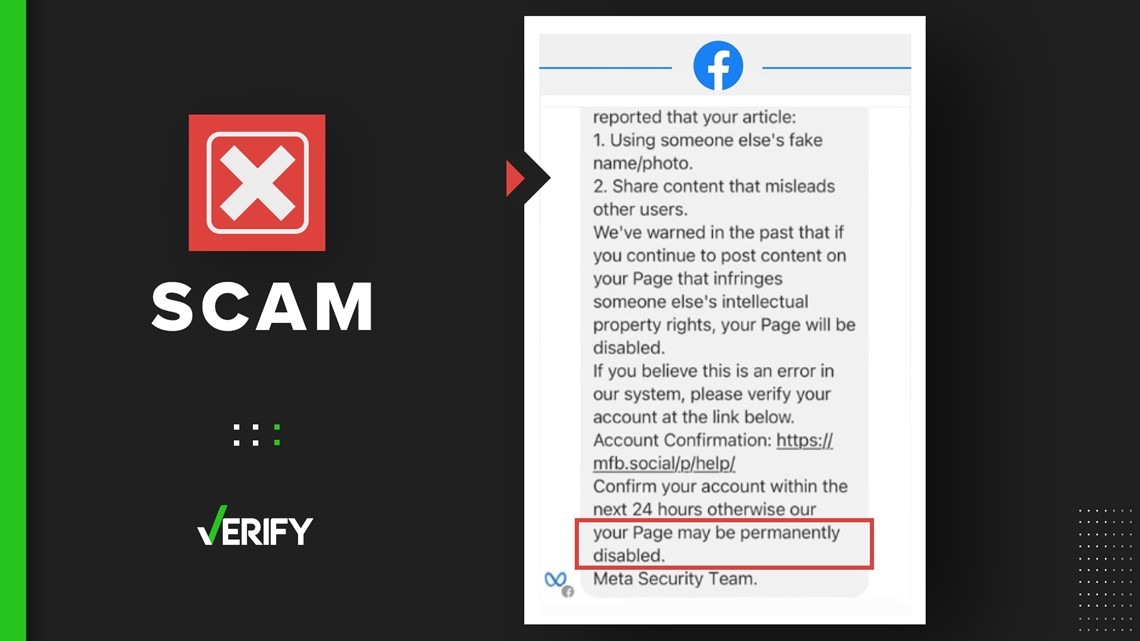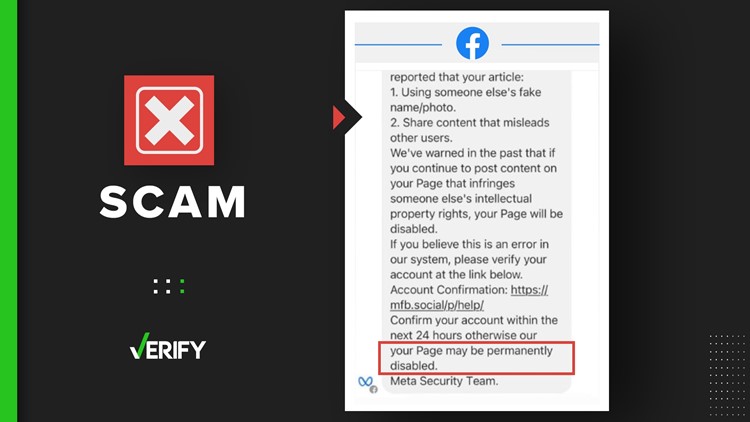An alarming message that has been circulating on Facebook since last year threatens to disable people’s accounts if they don’t hand over their personal information.
The message, which appears to be from Facebook, claims the user shared misleading content or posted something using someone else’s name on their page. The message warns that the person’s account will be disabled if they don’t click on a link confirming their account details within 24 hours.
VERIFY reader Unmbar and several others who received the message either via email or Facebook Messenger asked us to VERIFY if it was really from Facebook or a potential scam.
THE QUESTION
Is Facebook sending messages telling users their accounts will be disabled within 24 hours?
THE SOURCES
- Better Business Bureau (BBB)
- Malwarebytes, cyber security software company
- Tom Bartholomy, president and CEO of the BBB Southern Piedmont and Western North Carolina
THE ANSWER
No, Facebook is not sending messages telling users their accounts will be disabled within 24 hours. This is a phishing scam.
WHAT WE FOUND
Facebook is not sending messages threatening users that their accounts will be disabled within 24 hours if they don’t confirm their personal information. Malwarebytes and Tom Bartholomy, president and CEO of the BBB of Southern Piedmont and Western North Carolina, say this is just one of the latest scams going around on Facebook.
“They want you to click on a link, and at that point, they’re going to ask you to enter some personally identifying information to ‘verify’ that you’re really the Facebook user that they think you are, and that’s what they’re after; they’re harvesting your data,” Bartholomy told VERIFY.
“This is not how [Facebook would] alert you that you’ve run afoul of their security protocols,” Bartholomy added.
To spot this scam, there are some red flags you can look out for. First, check for any spelling or grammar errors in the message. Also, you can see the “Account Confirmation” link (https://mfb.social/p/help), does not mention Facebook or its parent company, Meta, nor does it point to Facebook’s official website www.facebook.com.


When VERIFY tried to access the link in Google Chrome, a “dangerous site” security alert immediately popped up warning that “attackers on the site you're trying to visit might trick you into installing software or revealing things like your password, phone, or credit card number.”
Facebook says users should always be leery of suspicious emails or messages that appear to come from Facebook. On its website, it says scammers sometimes create fake emails or messages that look like they’re from Facebook but they’re really not. These scam messages often contain:
- Notifications about friend requests, messages, events, photos and videos.
- False claims that you went against Facebook's Community Standards.
- Warnings that something will happen to your account if you don't update it or take a certain action.
- Claims or offers that sound too good to be true (such as winning a Facebook lottery.)
Facebook shares tips on how to keep your account secure on its “Avoid Spam and Scams” help center page:
Don’t click suspicious links: If you get a suspicious email or text or social media message claiming to be from Facebook, don’t click any links or attachments. First, check in your Facebook settings whether it came from Facebook.
Do not download files or software from people you don’t know: Use caution when installing browser extensions and third party apps, particularly when they offer functionality that sounds too good to be true or require you to login with your social media credentials before using them.
Don't answer messages that ask for your:
Password
Social security number
Financial information like credit card numbers
Strengthen your online security:
Enable two-factor authentication to add an extra security layer to your accounts across the internet. Two-factor authentication is one of the most effective tools for combating account compromise attempts.
Never reuse your password across multiple websites.
Use trusted antivirus software. It is important to keep this software up to date and scan your devices for malware regularly.
Turn on login alerts so you’ll be notified if someone is trying to access your account. Be sure to review your previous sessions to make sure you recognize which devices have access to your account.
Visit the Security Checkup Tool to help secure your account.
For businesses: Enable business notifications so you’ll be alerted of any changes happening within your Meta Business Manager Account.
If you receive a suspicious message, report it to Facebook at phish@fb.com. If you think someone has access to your account or you’re unable to log in, Facebook can help you recover it. Visit this page to take steps to regain access to your account.
VERIFY partner stations WCNC and WFMY contributed to this report.


